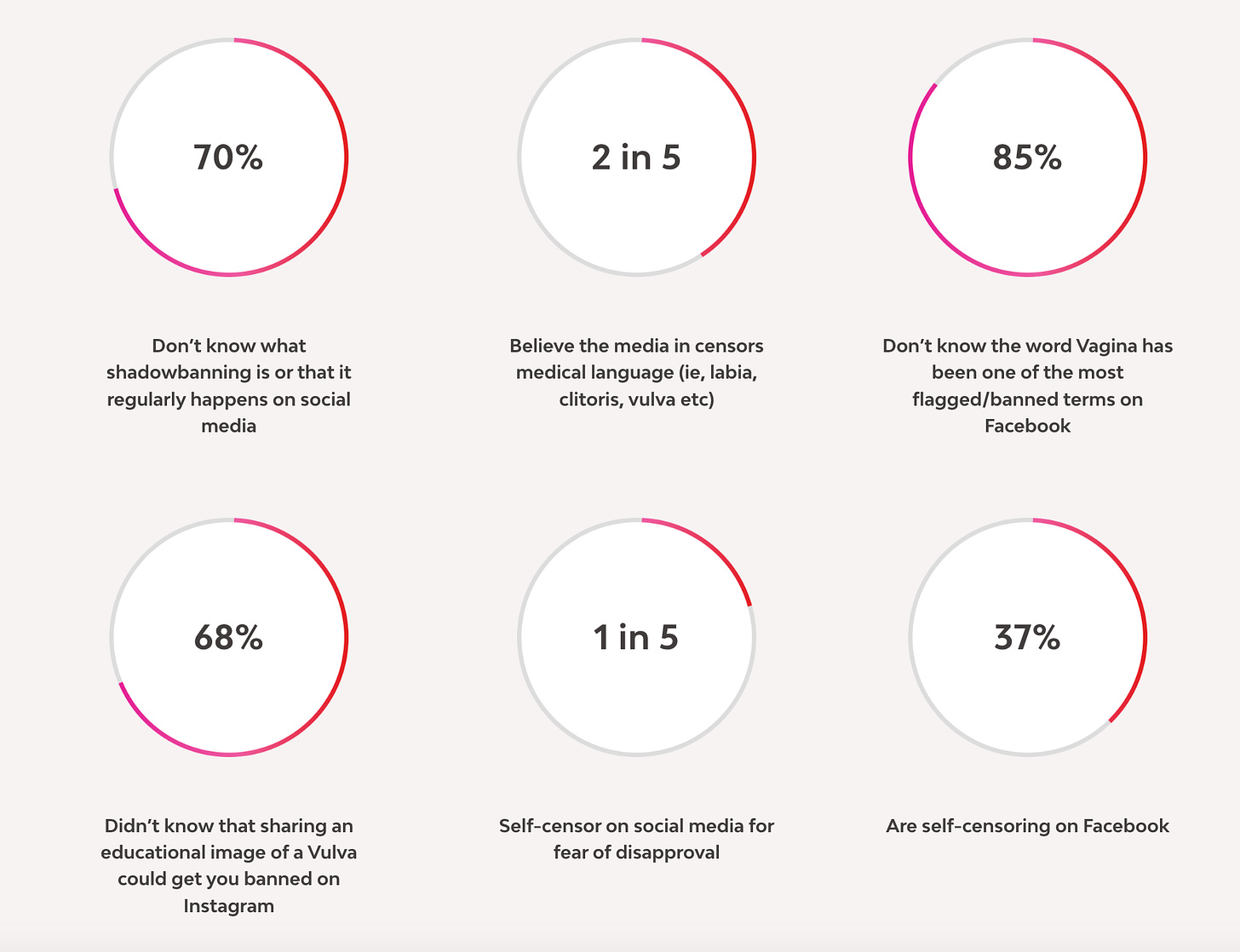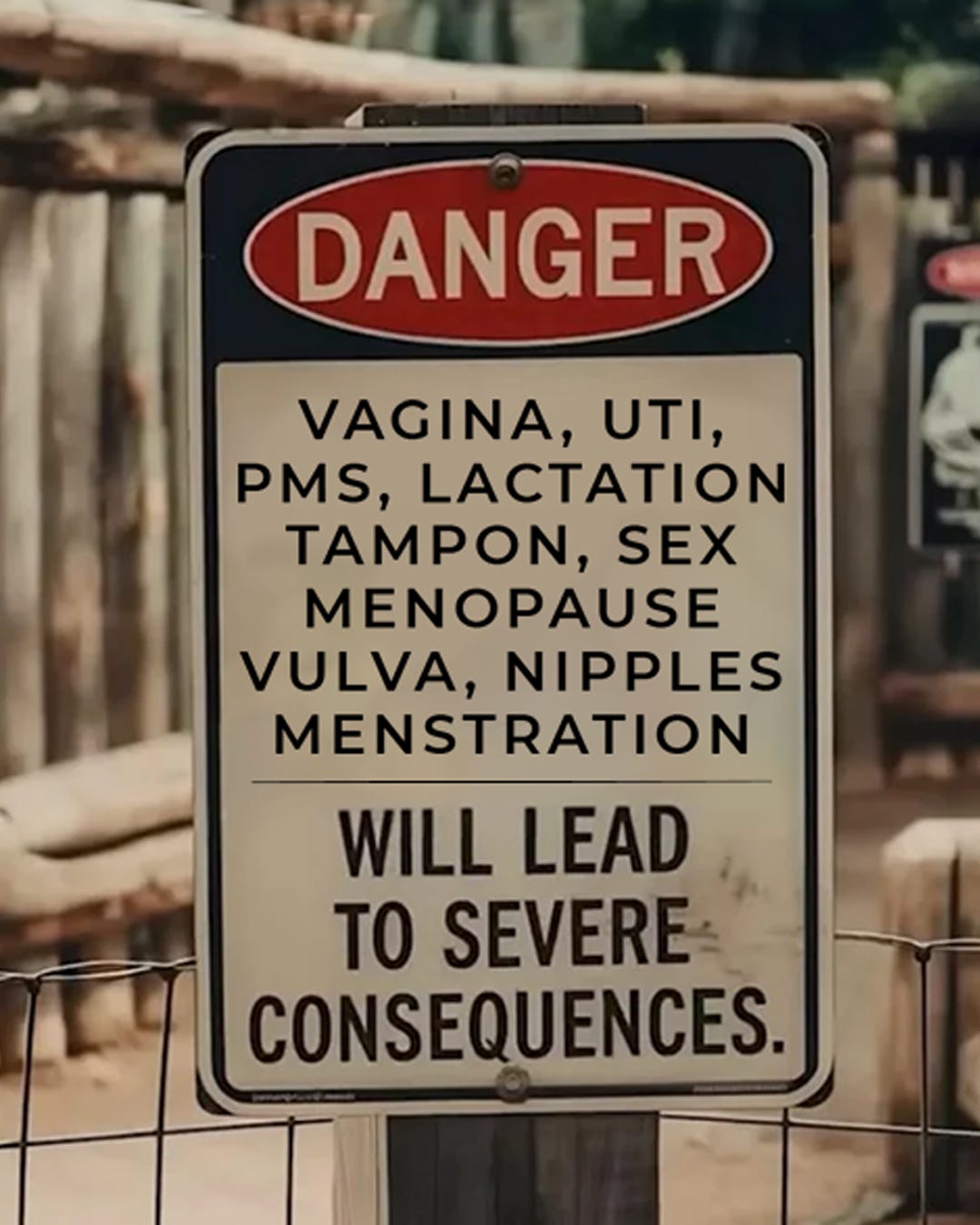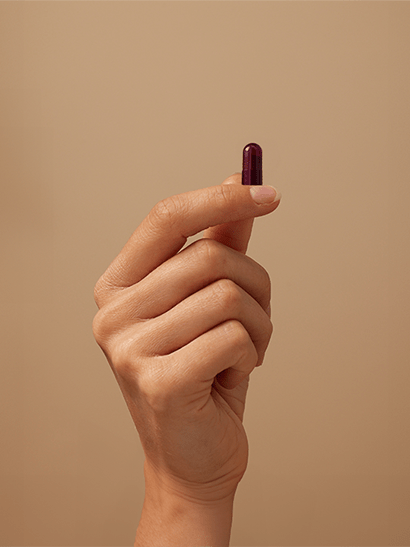When a system tells you to quiet down, it is not about manners. It is about money.
Here is what censorship looks like in real numbers: Women’s health companies report Amazon revenue losses ranging from $10,000 to $1 million. Tara Langdale Schmidt, president of VuvaTech, said, “I cannot grow my company or hire more help because, at any minute, Amazon can shut my entire account down. Amazon sales are 50% of my business. We just skate by every month.”
At Good Kitty, our CAC is 6x higher than it should be because Meta will not let us target women with recurrent UTIs. We pay to reach everyone and hope we accidentally hit our demographic. We can target women aged 35 to 55. We can target by location. We can even target behaviors like online shoppers.
Cool. So we can find women who buy throw pillows on Instagram, but not sexually active women who get bladder infections. Got it.
And still, the platform places our ads in men’s and teenagers’ feeds because we cannot target the reason someone needs us.
Half our impressions land on men’s feeds who will never need UTI prevention. The rest skew too young to be experiencing recurrent UTIs or peri-menopausal microbiome shifts.
We cannot target recurrent UTIs, sexual activity, bladder pain, or hormonal patterns. Those are labeled sensitive health data. So we pay to reach everyone. Conversion drops. CAC spikes. Then investors look at the numbers and say, “The traction isn’t there yet.”
The traction IS there. Unfortunately, we are navigating a biased internet. A non-neutral marketplace controlled by gatekeepers who decide what bodies deserve visibility. And historically, women’s bodies are not among them.
So yes, supplements promising ‘rock-hard,’ ‘diamond-strong,’ ‘steel-ready’ erections? Run those ads during family dinner.
A clinical solution for preventing bladder infections? Whoa, settle down. Way too spicy. We don’t want mass hysteria.
This is how censorship compounds into financial harm:
This is how censorship becomes financial harm:
Restricted reach leads to fewer clicks. Fewer clicks look like weak demand. Weak demand lowers valuations. Lower valuations shrink or kill funding rounds. Less funding slows growth. Slow growth is read as a small category. Investors decide women don’t spend money on their own health.
The algorithm manufactures false market conclusions by making us invisible. It is like being graded on a test you were not allowed to take.
Every time a women’s health company is flagged for sensitive content, we pay. Ad reach drops. CPMs spike. Funnels collapse. Organic visibility throttles. Social proof slows. Targeting becomes so broad it becomes useless.
This engineered inefficiency forces us to advertise to everyone and hope we accidentally reach the right demographic.
When Bodyform tried to normalize words like vagina, clitoris, and vulva, their ads were tagged too sexual and slapped with 18+ warnings. A protest outside Meta’s London office followed. Signs read “Let us mind our lady business” and “Get ovary it, Meta.” Within ten minutes, gray security shutters slid down over the windows. You could not storyboard a clearer metaphor for how women’s health gets treated online. Women speak and the system shutters. And shudders.
Bodyform’s research with 2,000 women found roughly forty words tied to our bodies and experiences that get quietly suppressed: menopause, miscarriage, puberty (in females), breastfeeding, besides the typical vagina, cervix, nipples, UTI, vulva, tampon and more. Some are banned outright. While others pushed down and de-ranked.
Platforms call it a glitch or an overzealous filter. At scale, those mistakes reroute attention, ad dollars, diagnoses, and investment away from women. Shadowbanning is an economic decision disguised as a technical error.

Bodyform’s poll results regarding censorship
At Good Kitty, once someone reaches our site, we convert at 4.7%. Half choose subscription. We retain 96% of them. Of those who cancel, a third return. Demand is real. The market exists.
Our problem is targeting rules that treat UTI prevention like pornography.
Market restriction is not market resistance. One is structural bias. The other is bad product-market fit. Guess which one investors understand better?
Algorithmic gatekeepers decide who can advertise and what language is allowed. Investors follow visibility. So when Meta flags the word “vagina” as explicit under the guise of content moderation, it’s diverting capital.
90% of women’s health brands have experienced censorship or shadowbanning.
Femtech receives 8.5% of global digital health funding, down from 14.7% in 2020.
Google Ads requires certification to advertise vaginal health, but not erectile dysfunction. Why?
Every violation notice feels very similar to the pink tax, only applied to language. When we can’t say the word, we can’t build the category.
The double standard is cultural and structural.
Erectile dysfunction is treated as medical. Vaginal dryness is treated as explicit. Same condition but for different genders with different cultural permissions.
Cialis set the precedent with a couple in separate bathtubs holding hands. What do separate bathtubs have to do with erections or sex? Nothing. But that ad ran everywhere. Primetime. Sunday afternoons. Probably carved into a mountainside somewhere. Hard to remember (no pun intended) with so many pills on the market dedicated to keeping penises operational.
There are more ED brands than words women are allowed to describe their own anatomy.
Because the priority was always protecting, funding, and normalizing male performance.
But what about female pleasure? What about our pain?
Advertising algorithms were trained to detect porn through women’s anatomy. Male anatomy has always enjoyed a commercial lane.
Coincidence is not the right word here. “Patriarchy” is getting warmer.
Even organic visibility is penalized.
Hashtags like #vagina, #pelvicfloor, #orgasm are restricted. Meanwhile, #menshealth, #testosterone, #performance are monetizable.
When we add #UTI to a post, our reach drops 70%. #menshealth receives four times the impressions of #womenshealth.
Again: contraband versus commerce.
It’s almost like the internet was built by people who think women only exist from the neck up.
And when accurate medical information is hidden, myths take its place. Behold, the greatest hits of medical misinformation:
Cranberry juice prevents UTIs. It does not. Thanks, Ocean Spray, but you would need 3 to 7 liters per day to equal the scientifically-proven 36mg of E.coli-blocking PACs in one Good Kitty capsule. That’s roughly one bathtub of cranberry juice. Daily. Your kidneys would like a word.
Yogurt cures yeast infections. No. Vaginal yeast infections require antifungal treatment. Not Greek yogurt or probiotic smoothies. Actual medicine. But prevention before the infection? Let’s talk.
If your vagina smells, eat pineapple. No. Vaginal odor is diagnostic and deserves discussion, not a tropical fruit intervention. Also, who started this rumor? Big Pineapple?
Douching is good for you. Absolutely not. It disrupts the vaginal microbiome. Your vagina is self-cleaning. It doesn’t need Lysol. It is one of the few things in modern life that actually works as designed.
You can’t get pregnant on your period. False. Sperm can live inside you for up to five days. Do the math.
“If you can’t orgasm, you’re broken.” Wrong again. Pleasure is anatomical and trainable, not a moral ranking. Also, 75% of women don’t orgasm from penetration alone. So if you’re broken, you’ve got company.
This is medical negligence created by algorithms, disguised as wellness culture, making women feel alone. Smelly. Filthy. Broken.
I call bullshit.
Words create markets. Name the problem and demand follows. Ban the word and the market disappears. If women cannot accurately describe our anatomy, capital stops flowing.
These restrictions cost us founder burnout, delayed diagnoses, stalled innovation and turn preventable conditions chronic. Women suffer in silence because no one ever taught us how our bodies work.
Every shadowban is a lost clinical outcome. Every violation notice is another woman asking Reddit for answers at 2am.
The only way this changes is when investors recognize taboo as a trillion-dollar category. When platforms define adult content by context, not gender. When clinicians, designers, and founders need to align and refuse to be silenced. If we don’t speak plainly about women’s bodies, who will? And we can’t afford to be polite anymore.
Censorship is financial. Every silenced word costs someone a diagnosis, a round, or a revolution.
Unblock us or get out of the way. We have work to do.
This is Part II of censHERship. Next Monday: Part III — Design As Defiance: How founders are smuggling truth past filters using aesthetics, humor, subtext, and beauty as weapons.
Read more

Here's the thing nobody says out loud: the algorithm doesn't have feelings, but it was trained by people who do. And apparently, those people think women's pleasure is obscene, menstruation is priv...

How women founders are smuggling truth past censors using aesthetics, humor, and beauty as weapons. The first time one of our ads was flagged for “adult content,” I was confused. The second, third,...













